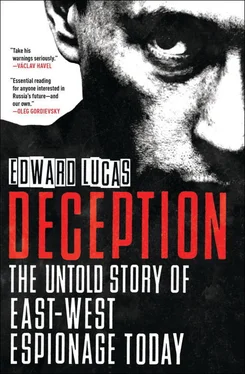1 A brief list would include the First World War, during which the front line ran through the territory of what later became Latvia, displacing around a third of the population; Bolshevik-backed insurrections in Estonia and Latvia, both put down by armed force; the Russian civil war; the rise and fall of the German Landeswehr and Freikorps ; a communist insurrection in Estonia in 1924; the Soviet occupations of 1940 and 1944; the intervening Nazi invasion; and a decade-long partisan war. A definitive history has yet to be written, but I recommend The Baltic States: the Years of Dependence by Romualdas Misiūnas and Rein Taagepera (Hurst & Co., 1993).
2 Kremlin propaganda presents all opponents of the Soviet Union during the war and after as ipso facto ‘fascists’, ‘war criminals’, and perpetrators of the Holocaust. The vast majority of the Estonians, Latvians and Lithuanians who fought the Red Army did so not as Nazi sympathisers but because they wanted their countries’ freedom. Westerners wrongly hold faraway peoples to a much higher standard than they apply to themselves. The atrocious treatment of Jews (and others) by Nazi collaborators in places like Lithuania rightly attracts condemnation. But it must be proportionate to the blame applied to (among others) Flemish, Dutch, Danish, French and Norwegian collaborators, whose countries were lucky enough not to end up in Soviet hands after the war. Hitler’s killers found willing henchmen in every occupied country and among every nationality (not least among Russians).
It is particularly unfair to argue, as did Gordon Brown, the former British prime minister, that ‘unlike in Germany, Lithuanian society has never gone through a period of reconciliation and repentance of its Nazi past’. Lithuania was not willingly part of Hitler’s monstrous empire. It suffered huge human and material losses at the hands of its German occupiers. For someone writing from the comfort and safety of a country that has not been invaded for nearly a millennium, to lecture a country that experienced hardship on a scale unimaginable to any modern British citizen is not just patronising, it is outrageous. Placed under foreign occupation, people will collaborate, either to save their own skins, or out of opportunism, or to protect family members, or perhaps because they think they are choosing the lesser of two evils. ‘Women of courage: Rachel Margolis’ by Gordon Brown, Independent, 9 March 2011 http://www.independent.co.uk/news/people/profiles/women-of-courage-rachel-margolis-2236081.htmlSee also Nazi/Soviet Disinformation about the Holocaust in Latvia by Andrew Ezergailis (Occupation Museum, Riga, Latvia, 2005).
3 The first in the series is Swallows and Amazons , set in the Lake District in northern England. Subsequent books are set in the Norfolk Broads; near Shotley in East Anglia; in the Outer Hebrides; and (in two more fancifully written books) on the coast of China and in the Caribbean. Close scrutiny of the text reveals many clues to Ransome’s past. I was rereading the entire canon (out loud to my daughter Izzy) during the writing of this book, and (I beg the indulgence of readers here) found the stories to be full of clandestine infiltrations and exfiltrations, deception operations, escapes, pursuits, surveillance, codes, disguises and what the children call ‘Indianing’ and ‘sleuthing’. A short list would include: Titty’s surveillance of the burglars in Swallows and Amazons ; Nancy and Peggy’s escapes from the Great Aunt in Swallowdale ; the use of Bill the cabin boy as an unwilling surveillance agent in Peter Duck ; the use of codes in Winter Holiday ; Tom Dudgeon’s evasion of the Hullaballoos’ pursuit in Coot Club ; the use of clandestine photography and a dangle in the Big Six ; the deception of the Dutch harbour pilot in We Didn’t Mean to Go to Sea ; the kidnapping of Bridget in Secret Water; the escape in Missee Lee ; the elaborate and misguided surveillance operation against the hapless Timothy in Pigeon Post ; the burglary and close cover operation in The Picts and the Martyrs ; and the elaborate deception, disguise and surveillance operations mounted against the sinister Mr Jemmerling in Great Northern .
4 The best is The Red Web: MI6 and the KGB Master Coup (Aurum Press, 1989) and a film of the same name, broadcast on the BBC’s ‘Inside Story’. Perhaps because the other events of that year were so dramatic, Tom Bower’s extraordinary scoop did not receive the attention that it should have done. I am deeply grateful for his exemplary and generous help, including access to his meticulous original notebooks.
5 MI6 : the History of the Secret Intelligence Service 1909 –1949 , by Keith Jeffery (Bloomsbury, 2010).
6 A microfilmed copy of the agency’s records was kept in the basement of Stig Synnergren, later head of the Swedish defence forces, in his home at Tullinge outside Stockholm, and was returned to defence ministry custody in 1997. As the researcher Jonas Öhman notes, this could be ‘perceived as symbolic in terms of the official attitude in Sweden to its post-war history’. See ‘A Review of Western Intelligence Reports Regarding the Lithuanian Resistance’, published as an afterword in a revised and updated edition of Forest Brothers, an Account of an Anti-Soviet Freedom Fighter , by Juozas Lukša (Central European University Press, Budapest, 2009), p. 393.
7 The original suggestion was for it to be headquartered in Oslo or Stockholm. The Swedish capital would remain important for SIS but proved too far from the action. Jeffery, p. 135.
8 Churchill’s Man of Mystery: Desmond Morton and the World of Intelligence (Government Official History Series) by Gill Bennett (Routledge, 2006) p. 42. She also notes the development of the SIS doctrine that spying is best done from a neighbouring country to the one being spied on.
9 See Die Geschichte der baltischen Staaten (Deutsche Taschenbuch Verlag, 1990) by Georg von Rauch; in English as The Baltic States: The Years of Independence: Estonia, Latvia, Lithuania, 1917 –1940 (St Martin’s Press, 1995). Another warring party in Estonia and Latvia was a powerful German army marooned in the east by the collapse of the Kaiser’s empire at the end of the war, which was trying to create a ‘Teutonic superstate’ in the east, in which German feudal hegemony over the region would survive. Though the northern Baltic provinces had been part of the Russian empire, they had been ruled by a powerful caste of Baltic German barons, the distant descendants of the medieval Teutonic Knights. Their rule and riches were deeply resented and they were soon to suffer the expropriation of much of their property in land reforms. The feudal era ended only in the mid nineteenth century; for Estonia and Latvia the era when serfs had to struggle even for literacy and the right to a surname was a bitter living memory. In Lithuania, books and newspapers in the Latin alphabet were forbidden under Tsarist Russification policies.
Adding a further dimension of complexity (and vulnerability) was a fierce conflict between Poland and Lithuania over the ancient city of Vilnius (Wilno in Polish). Once the historical capital of the old Grand Duchy of Lithuania, it had become predominantly Polish in the intervening centuries. Barely had Lithuania declared independence than in 1920 a Polish military force seized Vilnius. The two countries froze relations for twenty years, and the issue plagues their ties to this day.
10 In 2005 Mr Putin, answering a question from an Estonian journalist about Russia’s unwillingness to apologise for the Soviet occupation of the Baltic states, referred to it thus:
Читать дальше












